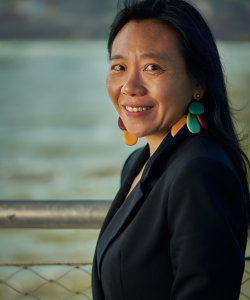Ten Questions for Alice Evelyn Yang

“One day, all that sacrifice will have been worth it.” —Alice Evelyn Yang, author of A Beast Slinks Towards Beijing
Jump to navigation Skip to content
Read weekly interviews with authors to learn the inside stories of how their books were written, edited, and published; insights into the creative process; the best writing advice they’ve ever heard; and more.

“One day, all that sacrifice will have been worth it.” —Alice Evelyn Yang, author of A Beast Slinks Towards Beijing

“Look up from your own desperation and walk outside. No matter the weather, be outdoors each day. It will help you.” —Andrés Cerpa, author of The Palace

“Advice for poets should be poems.” —Bianca Stone, author of The Near and Distant World

“Many unknown things are possible, many unexpected turns of events will arise.” —Xiaolu Guo, author of Call Me Ishmaelle

Ten authors answer the tenth question in our Ten Questions series: What’s the best piece of writing advice you’ve ever received?

This week’s installment of Ten Questions features Djaimilia Pereira de Almeida and Alison Entrekin, the author and the translator of Three Stories of Forgetting.

“You have to learn to write when you don’t feel like it.” —Raquel Gutiérrez, author of Southwest Reconstruction

“Art is following your soul’s demand.” —Juhea Kim, author of A Love Story From the End of the World

“It can take days, months, years for me to know when notes pass into the arena of poem or story.” —Devon Walker Figueroa, author of Lazarus Species

“I’ve learned to be most interested in enjoying the process of making something emotionally true and honest.” —Ashani Surya, author of Ravishing

“I think the creative process is unboundaried.” —Sarah Hall, author of Helm

“How can we reach a higher truth in storytelling and art?” —Brandon Hobson, author of The Devil Is a Southpaw

“At a certain point, you just have to make that shift into the difficulty head-on. You have to hit it.” —Emily Wilson, author of Burnt Mountain

“Becoming a mother, and feeling the ferocity of love that parents hold for their children, and doing the daily work of parenting, helped me find the emotional core of the book.” —Megha Majumdar, author of A Guardian and a Thief

“It should be possible to both write good and live good. Go see your friends. Be with your family. Taste something new. Fall in love with the world again and again while you still can.” —Joshua Wheeler, author of The High Heaven

“I think I’m a natural maximalist, and I still enjoy orchestrating a complex, layered scene or sentence, but I often found myself paring down versus building up.” —Jade Chang, author of What a Time to Be Alive

“I try to write every day, whether that’s generating new words or taking a walk to think about a revision problem.” —E. Y. Zhao, author of Underspin

“I wish all writers the audiences they desire and the acclaim they deserve.” —Ashley M. Jones, author of Lullaby for the Grieving

“When an impediment arrives, I try writing about it. This helps me remain patient.” —Jeannie Vanasco, author of A Silent Treatment

“Stop telling yourself you can’t do this.” —Patrick Ryan, author of Buckeye

“[Y]ou can’t edit something into being good before getting it down.” —Austyn Wohlers, author of Hothouse Bloom

“I needed time away from text to indulge in paintings and drawings and collage art. I spent a lot of days in art galleries mulling over my memories and the text I was writing.” —Raymond Antrobus, author of The Quiet Ear: An Investigation of Missing Sound

“I like the idea of action writing, putting text on the floor and playing with arrangement like abstract expressionist painting.” —Anne Waldman, author of Mesopotopia

“But fear can be galvanizing; perhaps the novel would not have been written without it.” —Xenobe Purvis, author of The Hounding

“I just remember the miraculous appearance of story seeds, bursts of inspiration, and cloudless composition.” —Ed Park, author of An Oral History of Atlantis